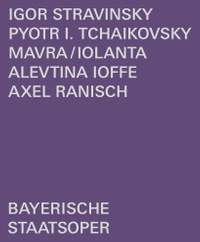Recording of the Week,
Mavra/Iolanta from the Bayerische Staatsoper
The no-frills covers may look a little economy-brand, but no-one could accuse the Bayerische Staatsoper’s new label of not thinking outside the box with repertoire, or of skimping on quality in terms of the performances themselves. Their DVDs of Korngold’s Die tote Stadt and Hans Abrahamsen’s The Snow Queen both scooped Gramophone Awards in October - and this month the young artists of their studio programme shine just as brightly as the established stars who lit up those productions in an ingenious fusion of two one-act Russian operas, filmed at the Cuvilliés Theatre in 2019.
 Tchaikovsky’s lushly lyrical final opera Iolanta and Stravinsky’s rumbustious (and much shorter) Mavra make for more natural bedfellows than the musical and dramatic contrasts between them might suggest – the two were given as a double-bill at Guildhall a few years ago, but director Axel Ranisch goes one step further here and folds them into one another rather than presenting them sequentially. Mavra (a sparky comedy which sees a young girl sneaking her corsair lover into her mother’s household by disguising him as a cook) is played out as a sequences of entr'actes which the blind, teenage princess Iolanta enacts with her dolls as she languishes in a secluded castle, kept unaware of her disability by her father as she awaits an arranged marriage with the duke Robert.
Tchaikovsky’s lushly lyrical final opera Iolanta and Stravinsky’s rumbustious (and much shorter) Mavra make for more natural bedfellows than the musical and dramatic contrasts between them might suggest – the two were given as a double-bill at Guildhall a few years ago, but director Axel Ranisch goes one step further here and folds them into one another rather than presenting them sequentially. Mavra (a sparky comedy which sees a young girl sneaking her corsair lover into her mother’s household by disguising him as a cook) is played out as a sequences of entr'actes which the blind, teenage princess Iolanta enacts with her dolls as she languishes in a secluded castle, kept unaware of her disability by her father as she awaits an arranged marriage with the duke Robert.
The breakout star of the Class of 2019 is British-Italian tenor Freddie De Tommaso, who’s since gone on to triumph in Puccini and Verdi at several of the world’s major houses as well as releasing two solo albums on Decca. He certainly makes his mark here in the short but demanding role of the lusty corsair Vassili in Mavra, but I’ll wager that only the most sharp-eared of listeners will recognise him before the eleventh hour – until the last five minutes, he and the rest of the Stravinsky cast are clad in enormous prosthetic bobble-heads as they act out Iolanta’s often rather adult games, and all four of them enter into the spirit of the production so convincingly that for the first scene I genuinely thought the characters were being portrayed by life-size puppets, with the singers performing from the pit or wings.
But De Tommaso is by no means the only name to watch in this mouth-watering showcase of young talent – indeed, there isn’t a singer on stage whose career I won’t be following eagerly over the next few years. First among equals is the luminous Estonian soprano Mirjam Mesak as an enormously touching Iolanta: a natural actress who has nothing to fear from the camera’s scrutiny, she captures the sequestered princess’s vulnerability rather more poignantly than the heftier-voiced Anna Netrebko did in the studio a few years ago, but misses none of the character’s burgeoning sensuality.
 And her silvery upper register can pack quite a punch when Tchaikovsky’s soaring lines require it – she and the warm-voiced Chinese tenor Long Long are simply superb in Iolanta and Vaudémont’s extended love-duet (just one of the passages where Richard Whilds’s sensitive chamber orchestration allows these young voices to really shine in roles that might still push them to their limits in a larger-scale setting).
And her silvery upper register can pack quite a punch when Tchaikovsky’s soaring lines require it – she and the warm-voiced Chinese tenor Long Long are simply superb in Iolanta and Vaudémont’s extended love-duet (just one of the passages where Richard Whilds’s sensitive chamber orchestration allows these young voices to really shine in roles that might still push them to their limits in a larger-scale setting).
2019 was clearly a plum year for baritones and basses at the Munich opera studio, and with five substantial roles for lower male voices Iolanta was a canny programming-choice. The Czech bass-baritone Boris Prýgl brings the house down with Robert’s ardent paean to the beauty of his (unseen) beloved Mathilde, Turkish baritone Oğulcan Yılmaz turns in a beautifully nuanced performance as the ‘Moorish’ physician enlisted to cure Iolanta’s blindness, and imposing Finnish bass Markus Suihkonen delivers a world-weary gravitas that belies his 26 years as King René. (He’s biding his time in Mozart and smaller Puccini roles for now, but looks set to step into his compatriot Matti Salminen’s outsize shoes in the great Wagner roles one day…).
With a dark, Sophoclean twist in the tale which I won’t spoil here (though the image above might offer a clue), Ranisch’s fusion of these two works only serves to enhance both – I sense another award in the offing for this innovative label, and stellar careers for many of the Munich alumni…
Iolanta: Mirjam Mesak (Iolanta), Long Long (Vaudémont), Boris Prýgl (Robert), Markus Suihkonen (King René), Oğulcan Yilmaz (Ibn-Hakia), Caspar Singh (Alméric), Oleg Davydov (Bertrand), Noa Beinart (Marta), Anaïs Mejías (Brigitta), Yulia Sokolik (Laura), Nora Bollmann (The Patriarch)
Mavra: Anna El-Khashem (Parasha), Freddie de Tommaso (Vassili), Noa Beinart (Mother), Yulia Sokolik (Neighbour)
Opernstudio der Bayerischen Staatsoper, Bayerisches Staatsorchester, Axel Ranisch, Alevtina Ioffe
Available Format: DVD Video
Iolanta: Mirjam Mesak (Iolanta), Long Long (Vaudémont), Boris Prýgl (Robert), Markus Suihkonen (King René), Oğulcan Yilmaz (Ibn-Hakia), Caspar Singh (Alméric), Oleg Davydov (Bertrand), Noa Beinart (Marta), Anaïs Mejías (Brigitta), Yulia Sokolik (Laura), Nora Bollmann (The Patriarch)
Mavra: Anna El-Khashem (Parasha), Freddie de Tommaso (Vassili), Noa Beinart (Mother), Yulia Sokolik (Neighbour)
Opernstudio der Bayerischen Staatsoper, Bayerisches Staatsorchester, Axel Ranisch, Alevtina Ioffe
Available Format: Blu-ray




